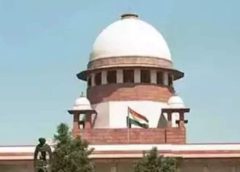
Hijab ban case: Supreme Court issues notice to Karnataka govt; next hearing on September 5 | India News
[ad_1]
NEW DELHI: The Supreme Court on Monday sought response from the Karnataka government on pleas challenging the high court verdict refusing to lift the ban on hijab in educational institutions of the state.
A bench of Justices Hemant Gupta and Sudhanshu Dhulia issued notice to the state on the pleas and posted them for hearing on September 5.
The bench also pulled up the petitioners, who sought adjournment in the matter, and said it would not permit “this kind of forum shopping”.
Solicitor General Tushar Mehta said he would accept notice in the bunch of petitions and added, there is no need for a response affidavit.
Mehta said since the case involved a pure question of law, no reply affidavit from Karnataka govt is needed. He told SC petitioners had mentioned 6 times seeking urgent hearing.
Petitioners through Mohd Nizamuddin Pasha said urgent hearing was sought when exams were round the corner.
Pasha and other advocates said they need to prepare with the case. The SC said “you were mentioning for urgent hearing without being prepared with the case?”
One of the appeals in the top court has alleged “step-motherly behaviour of government authorities which has prevented students from practising their faith and resulted in an unwanted law and order situation”.
The appeal said the high court in its impugned order “had vehemently failed to apply its mind and was unable to understand the gravity of the situation as well as the core aspect of the Essential Religious Practices enshrined under Article 25 of the Constitution of India”.
“Wearing of hijab or headscarf is a practice that is essential to the practice of Islam,” it has added. Karnataka high court in March had held that the prescription of uniforms is a reasonable restriction that students could not object to and dismissed various petitions challenging a ban on hijab in education institutions saying they are without merit.
The hijab row had erupted in January this year when the Government PU College in Udupi allegedly barred six girls wearing the hijab from entering. Following this, the girls sat in protest outside college over being denied entry. After this, boys of several colleges in Udupi started attending classes wearing saffron scarves.
This protest spread to other parts of the state as well leading to protests and agitations in several places in Karnataka. As a result, the Karnataka government said that all students must adhere to the uniform and banned both hijab and saffron scarves till an expert committee decides on the issue.
On February 5, the pre-University education board released a circular stating that the students can only wear the uniform approved by the school administration and that no other religious attire will be allowed in colleges.
The order stated that in case a uniform is not prescribed by management committees, then students should wear dresses that go well with the idea of equality and unity, and do not disturb the social order.
A batch of appeals was filed against the government’s rule in the Karnataka High Court by some girls seeking permission to wear the hijab in educational institutions.
On February 10, the high court had issued an interim order stating that students should not wear any religious attire to classes till the court issues the final order.
The hearings related to the Hijab case concluded on February 25 and the court had reserved its judgement.
A bench of Justices Hemant Gupta and Sudhanshu Dhulia issued notice to the state on the pleas and posted them for hearing on September 5.
The bench also pulled up the petitioners, who sought adjournment in the matter, and said it would not permit “this kind of forum shopping”.
Solicitor General Tushar Mehta said he would accept notice in the bunch of petitions and added, there is no need for a response affidavit.
Mehta said since the case involved a pure question of law, no reply affidavit from Karnataka govt is needed. He told SC petitioners had mentioned 6 times seeking urgent hearing.
Petitioners through Mohd Nizamuddin Pasha said urgent hearing was sought when exams were round the corner.
Pasha and other advocates said they need to prepare with the case. The SC said “you were mentioning for urgent hearing without being prepared with the case?”
One of the appeals in the top court has alleged “step-motherly behaviour of government authorities which has prevented students from practising their faith and resulted in an unwanted law and order situation”.
The appeal said the high court in its impugned order “had vehemently failed to apply its mind and was unable to understand the gravity of the situation as well as the core aspect of the Essential Religious Practices enshrined under Article 25 of the Constitution of India”.
“Wearing of hijab or headscarf is a practice that is essential to the practice of Islam,” it has added. Karnataka high court in March had held that the prescription of uniforms is a reasonable restriction that students could not object to and dismissed various petitions challenging a ban on hijab in education institutions saying they are without merit.
The hijab row had erupted in January this year when the Government PU College in Udupi allegedly barred six girls wearing the hijab from entering. Following this, the girls sat in protest outside college over being denied entry. After this, boys of several colleges in Udupi started attending classes wearing saffron scarves.
This protest spread to other parts of the state as well leading to protests and agitations in several places in Karnataka. As a result, the Karnataka government said that all students must adhere to the uniform and banned both hijab and saffron scarves till an expert committee decides on the issue.
On February 5, the pre-University education board released a circular stating that the students can only wear the uniform approved by the school administration and that no other religious attire will be allowed in colleges.
The order stated that in case a uniform is not prescribed by management committees, then students should wear dresses that go well with the idea of equality and unity, and do not disturb the social order.
A batch of appeals was filed against the government’s rule in the Karnataka High Court by some girls seeking permission to wear the hijab in educational institutions.
On February 10, the high court had issued an interim order stating that students should not wear any religious attire to classes till the court issues the final order.
The hearings related to the Hijab case concluded on February 25 and the court had reserved its judgement.
[ad_2]
Source link


